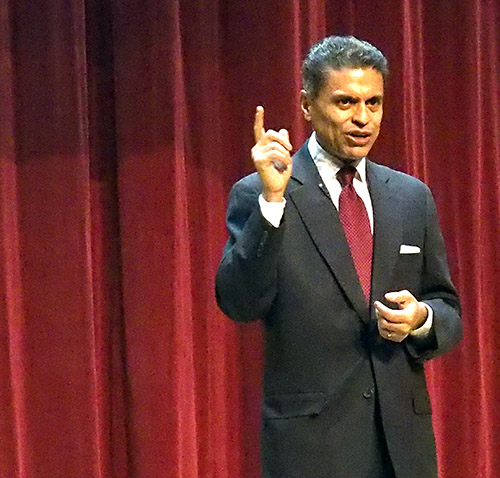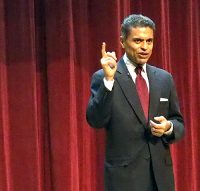By Blake Meacham & Alyssa Nehring–“What does everybody remember the most about elections? It’s rhetoric more than anything else. Can you imagine the quotes that people will remember from this election?”
Fareed Zakaria opened up Tuesday evening with that witty joke, poking fun at the increasing ridiculousness of the current election between Donald Trump and Hillary Clinton. Surprisingly, the next hour that was Zakaria’s speech had little to do with the current landscape of politics, and more to do with the world and how the United States has influenced it over the past 70 years.
Zakaria said it started after World War II, when the U.S. asked the rest of the world’s powers to open their markets so that not only the United States, but the world, could reap its benefits. Economies boomed, and the United States became the ultimate power.
Shortly after, the world became more and more western, according to Zakaria. Now, he says, the world isn’t necessarily controlled by the western powers, but influenced by it.
“Today, the world is heading into an age that will not be owned by the west, but shared by the west,” claimed Zakaria.
The entire western hemisphere is at peace for the first time in what seems like forever. This was confirmed on August 29th, when the Colombian Civil War ended after nearly 50 years of turmoil. Zakaria claims that this is remarkable because of all the negative publicity that the world seems to be getting from the violence in the middle east.
“If you really look at it, only one-fifth of humanity is going through fierce war and battles. Four-fifths of humanity is experiencing a historic time of peace,” says Zakaria.
Zakaria also says that since the cold war ended, no great power has been in any kind of war against each other, whether it’s cold or hot. He claims this is vital because the great powers are working together to create a more sustainable and peaceful world.
Another point that Zakaria hit hard was the current state of the U.S. economy and job sector. He says that soon, jobs will boom because of the amount of millennials that will be looking for work.
“The United States has too many young people that can’t and don’t work. This will change once young adults graduate from college and gain more experience in the work force.”
According to Zakaria, the United States has created more jobs in the past 8 years than the next 34 most industrialized countries combined. To Zakaria, this means the United States has an incredibly exciting future ahead of it that young and old alike can take advantage of.
Zakaria does have one fear, however: “My biggest fear is that the United States will lose its unique sense of confidence and become fearful of the world around it.”
Many students, faculty, and members of the general public attended Zakaria’s presentation. He left the audience with a broader insight on not only how the past has influenced America today, but also the continued influence on our future.
One audience member said, “I thought he had a wonderful knowledge of history and the state of the world. He gave me a lot of food for thought.”
Kailyn Roberts, a freshman, was prepared for Zakaria’s lecture. “I was really excited to hear Zakaria speak after reading his book ‘The Post American World’ in one of my classes, and he did not disappoint. It was awesome to be able to relate it back to my classes- I felt like I learned a lot,” Roberts said.
Overall, Zakaria was a calm and confident speaker who grabbed the audience’s attention with his intellect and unbiased analysis. Because of this he reached the audience on a personal level.
“I thought he was one of the best that I’ve heard at Morningside in the Waitt Lectures. The things that he said made sense to me. As someone who’s not highly informed about things, but I keep up. I thought he made sense,” said Kathy Martin, Morningside Campus Chaplain.







Leave a Reply